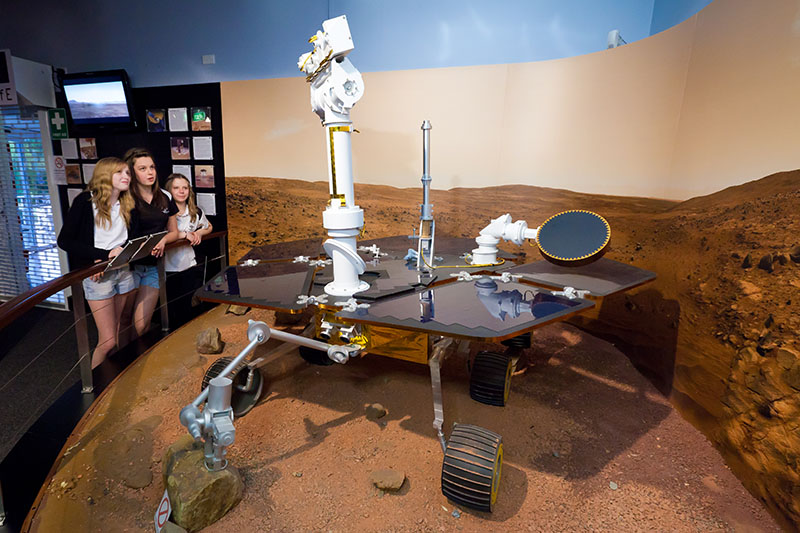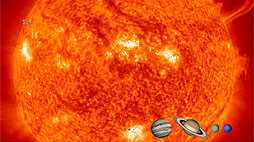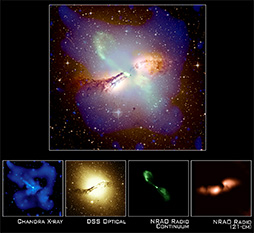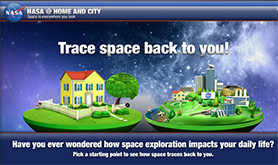Information For Teachers

We are here to help you
We recognise that teaching is a tough business but at the same time it is one of the most rewarding. There are so many challenges to face each day and just keeping up with all the latest news and discoveries can be daunting, plus being able to answer all those questions you're bombarded with from students.
Space science is a particularly difficult subject and involves some really big concepts. While we can't be in the classroom with you, we want to help you as much as we can.
NASA and JPL (Jet Propulsion Laboratory) have a large focus on education. For them (and us), educating students in areas of Science, Technology, Engineering and Mathematics (STEM) is an investment in the future and so they have created a wealth of materials, projects, classroom activities and lesson plans which you can use.
Their resources are all easily adaptable to the national curriculum. Under the Education Links on this page you will find a number of sites that we can recommend where you can download useful materials for students from K-12, plus some very specific materials for you as an educator under the Resources section on this page.
What can we do to help you?
Don't ever be afraid to just ask us for help. We are here to provide you assistance, answer questions and where possible, provide access to space-related education resources.
If you or your students have a question that you can't find the answer to or you're just not sure about something space-related, then please contact us via phone, mail or email. We can also do video chats! Remember - there are no silly questions, so don't be afraid to ask.
Please note: we will generally not provide answers for 'ask a scientist or expert' assignments on general space related topics where primary sources can easily be found elsewhere. We get a large number of students emailing us for these sorts of assignments and we unfortunately do not have the time to provide answers. We are happy to answer if the questions are specifically about the Complex and its role.
- Bring your students on an excursion to our Complex. Our programs are free - you just have to get here.
- If you want some professional development, we are happy to speak with you about arranging a time for you to visit us and provide some one-on-one or group programs.
Booking an Excursion
We look forward to making your visit as easy and enjoyable as possible. Please note that places fill fast each Term, so your advance booking helps us to ensure that staff are available to guide you through your visit.
Further information on booking an excursion can be found on the following links:
You can find our Risk Assessment and Public Liability Insurance documentation here.
Things you need to know
The CDSCC Visitor Centre is located on the grounds of the Canberra Deep Space Communication Complex about 45 minutes drive southwest of Canberra city centre.
Due to the relative isolation of the Complex, you need to note the following:
- Mobile phone coverage in the area is limited
- First aid assistance can be provided by staff but ambulance services would take up to 45 minutes to reach the Complex (please advise us of any known/potential medical issues)
- Roads in the area are sealed but rough surfaces can be encountered - please drive carefully
- The nearest petrol station is 25 kilometres from the Complex (we do not provide fuel)
- Roads wind through bush and farmland, so animals (kangaroos, emus, wombats, sheep and cows) do move across roads without warning at any time of day - please drive carefully
Bringing students to the Complex, we expect that you will:
- Ensure that there is an adequate 'teacher to student' ratio as required by your local education departments
- Ensure that students are supervised at all times and that members of the public are not disturbed or inconvenienced
- Ensure that you are carrying any medications required by students - we cannot administer any medications but will provide general first aid and contact medical services if required
- Ensure that students follow all instructions given by staff
National Capital Education Tourism Project
The National Capital Education Tourism Project provides assistance for teachers planning excursions to the Australian Capital Territory, including both attractions and accommodation. There is also the Parliament and Civics Education Rebate (PACER) which is an initiative of the Australian Government. It provides some financial assistance for students in Year 4-12 across Australia to travel to Canberra, the nation’s capital. Find more information about PACER here .
Fast Facts - Education Programs
- Programs are suitable for year 3-12
- We do not provide programs for year P-K-2
- Programs run for 90 minutes
- We do not run night programs
- Programs operate Mon-Fri
- We do not provide programs in ACT school/public holidays
- Programs and admission are free
- Minimum group size of 10 students
- Bookings are essential
- Bookings run 6-18 months in advance
- Special needs students catered for
- G'n'T students catered for
- Specific subject programs on request
Education Links
Resources
Scale
Suitable for Year 3-12.
Our popular presentation on the scale of objects in the universe.
Powerpoint format - File size: ~40MB

Multiwavelength Astronomy
Suitable for Year 5-12
Our presentation on how we use the electromagnetic spectrum to explore space. Starting with an Earth-based context that the students will be familiar with, and then moving to planets, nebulae, and galaxies.
Powerpoint format - File size: 12.9MB
Note: Additional animation to download (needs to be re-embedded in the presentation) - 3.8MB .mov here

Citizen Science
Suitable for Year 4-12
Certain projects may be suitable for younger students
As a volunteer on these websites, both you and your students can become citizen scientists and citizen researchers, participating in real science and other research.

ZooTeach is a repository of lessons and resources for teachers, including: guides to projects for students and teachers, teacher-created presentations designed to introduce students to a particular project, and lessons developed to connect your students to projects and research within the context of things they already know.

NASA Spinoffs Home and City (interactive)
Year 5 - Science as a Human Endeavour ACSHE083 . Describing how technologies developed to aid space exploration have changed the way people live, work and communicate
